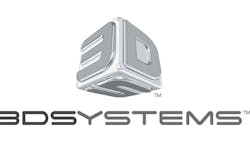3D Systems is buying a majority stake in a French manufacturer of 3D printers, Phenix Systems, a move that will expand its position in the additive manufacturing sector – including new applications that support (or compete with) metalcasting operations.
No price was revealed for the 80% stake that 3D Systems is acquiring, though it stated the maximum price would be 13 euros/share. That is estimated to represent $20 million. The purchase is expected to close in July, and 3D Systems stated it intends to launch a takeover bid for the remaining 20% of Phenix Systems after the initial deal is final.
Phenix Systems, headquartered in in Riom, France, designs and manufactures printers that produce metal parts using direct metal laser sintering technology, or DMLS. The process converts a CAD design of a part into .stl file format. This information is read as “layers” by the printer, which fuses metal powder using a fiber-optic laser, and deposits layer after layer of the fused metal to recreate the design in three dimensions.
Whereas different additive manufacturing technologies can be used to produce molds, cores, and prototypes, DMLS may be used to manufacture some finished parts.
Fully Dense Metal Parts
Phenix Systems’ machines print fully dense metal and ceramic parts from very fine powders (6 to 9 microns granularity). Materials include stainless steel, tool steel, super alloys, nonferrous alloys, precious metals, and alumina. Parts produced in this manner are supplied to manufacturers in aerospace, automotive. and medical device industries.
The addition is significant for 3D Systems: it already supplies 3D printers that use alternative technology (selective laser sintering), and bringing direct metal technology into the portfolio strengthens its offering to important manufacturing segments.
“Phenix represents the perfect strategic fit for us and we are thrilled to welcome François Reymondet, Patrick Teulet and their entire team to 3D Systems once the deal has closed,” stated president and CEO Avi Reichental. “Our complementary capabilities in advanced manufacturing combined with our effective R&D and extensive marketplace reach and coverage are sure to result in current and future direct metal solutions that will delight our customers.”
Besides printers, South Carolina-based 3D Systems supplies 3D print materials, and production services, and it offers CAD modeling, reverse engineering and inspection software tools.
Earlier this year, 3D Systems bought Geomagic Inc., a developer of software programs for 3D design and inspection.
About the Author
Robert Brooks
Content Director
Robert Brooks has been a business-to-business reporter, writer, editor, and columnist for more than 20 years, specializing in the primary metal and basic manufacturing industries. His work has covered a wide range of topics, including process technology, resource development, material selection, product design, workforce development, and industrial market strategies, among others.
